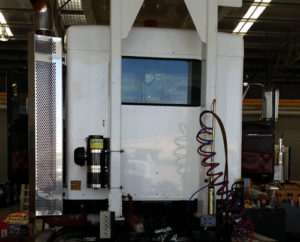Diesel Particulate Matter and why we need to avoid it
Earlier this month the Cancer Council Australia released an article which has created a few shock waves throughout the transport industry. Whilst airborne particulates such as asbestos have been in the public eye for the damage it can cause those who inhale it, Diesel Particulate Matter or DPM as it is often called and the dangers of this particulate is not as well known and identified as a hazardous material to the extent of asbestos. However in the last two decades there has been a number of studies carried out on the effect that DPM has on the human body and it has now been classed as a Group 1 carcinogen meaning it is a proven established cause of cancer in humans. The World Health Organisation estimates that people regularly exposed to diesel exhaust fumes could be up to 40 per cent more likely to develop lung cancer. This fact on it’s own should be enough to realise we need to take more notice of DPM and the dangers associated to it.
There are a few ways we can decrease the possible exposure to DPM in the transport industry and one may sound simple, keep the windows up when driving a diesel fume emitting vehicle. Minesites across Western Australia do not allow vehicles to drive with their windows down for this reason as well as other safety factors yet every day across Western Australia there would be many drivers of DPM emitting vehicles who drive with their window down instead of keeping the window up and running the air conditioning system instead. A major reason for this would be the fact that the air conditioning system is not working efficiently.This is why pre-summer servicing on trucks is an idea we at Lyonsemphasise to help assist the operators in not feeling the need to drive with the window open. An efficient working air conditioning system will keep the operator comfortable and help eliminate the possible exposure to diesel fumes.
Another way to combat the dangers of DPM exposure would be providing pressurised filtered air into the cabin of these vehicles. Cabin pressurisation is widespread across the mining industry to provide the operators of earthmoving equipment fresh filtered air however at Lyons we have seen a spike in trucking companies requesting pressurisation for their vehicles. Cabin pressurisation is achieved by creating a positive pressure inside a cabin and introduces fresh air into the cabin by the use of a filter. Lyons are able to install filtration units that can filter out any DPM particulates prior to entering the cabin. The operator therefore only gets fresh, filtered air to breathe which in turn has benefits such as keeping the operator more alert as well as knowing the air is clean of any dangerous particulates. Lyons are able to design a system to fit any make of vehicle.
Diesel Particulate Matter is a carcinogenic substance which all industries need to understand the hazards of and take as seriously as dangerous substances such as asbestos. The responsibility has to be on both the employee and the employer to reduce the risk, and if it is as simple as ensuring that you keep the window up whilst driving then this is something we as an industry should embrace and make as a standard. For more information on the dangers go to the Cancer Council Australia’s webpage or if you are interested in an air conditioning service or a cabin pressurisation system for your vehicle contact Lyons.



